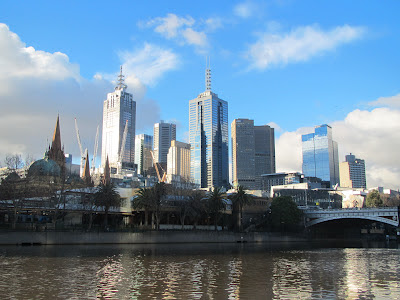Some parts of Australia are truly iconic and the General Ocean Road falls into that bracket. Like the Sydney Opera House, the Great Barrier Reef and the MCG, this was etched on my hypothetical 2012 to-do list in block capitals - and the luxury of a long weekend afforded us the perfect opportunity to hit the trail.
Make no mistake, it was cold. Those monstrous waves were crashing for a reason, the wintry wind was up and it was a day to don jackets and jumpers every time we stepped out of the car. The coarse weather only served to paint a more spectacular picture, though, as we drove along.
It's not an easy route by any means. The twists and turns give you great views but they require real concentration and sensible driving. As we turned one particularly sharp corner, we suddenly realised the Ocean Road had claimed its latest victims - a group of Japanese tourists who clearly hadn't heeded the speed warnings. Their car was intertwined with a road sign after shooting off the bitumen and coming to rest on the hillside.
All those hours behind the wheel seemed but a second, however, when we were rewarded with the simply unmatchable landscape of the Twelve Apostles. These giant stacks - actually seven in number - would serve as one of the world's best geography field trips, such is their vivid illustration of how land has been eaten away over thousands of years by the incessant pounding swell of the sea. Camera lenses pointed all around us and red tourist helicopters buzzed overhead. Yet, with pedestrian access limited to the clifftops, this magnificent spectacle remains untouched by human hands. That's one small mercy for the Apostles, who get smashed by a wave every 14 seconds. One for the stattos there.
Similar stacks stand further along the Shipwreck Coast - and you can see just why it earned that name. Tales are told of English sailors sighting land here after three months at sea, only for their ships to be broken up on these fearsome rocks. Talk about threading the eye of a needle. But that was a risk they were willing to take in order to make the journey to Australia. How fortunate we are to be able to fly the same distance in less than 24 hours.
We reached London Bridge (above) and decided our Great Ocean Road trip was complete. As we looked out from the platform, I kept thinking of the two tourists stranded on the right-hand end of the bridge when the centre crumbled into the sea in January 1990. One day, all of this will be washed away. All the more reason to capture it on camera, even more so with Nathan at our side.
Back in Melbourne the sun shone. I bang on about this city every time we're here but I just think it's magic. We rode on jam-packed rattling trams from one sparkling shopping district to the next and drank coffee on the Yarra River's Southbank. A rower glided under the bridge. Food smells from around the world wafted out of the food court. Television screens blinked at us from behind the counters and the distinct colours of footy scarves began to appear around the necks of patrons as day shuffled into evening.
Two of those necks belonged to Bean Bell and I. Bean is the daughter of our favourite Melburnians - Rob and Jan Bell - and she also happens to barrack for St Kilda, who were playing 'our' Geelong Cats that very night. Tickets had been purchased; after all, Nathan couldn't fly home without experiencing the AFL.
The game was played under the roof at Etihad Stadium.
Geelong led for most of the game and, despite a horribly wobbly third quarter, they got home by 42 points. The Cats are expected to play finals footy in September, St Kilda aren't. But regardless of the result, the code, or even which hemisphere you're in, the buzz of the big game remains as intoxicating as ever.
Subscribe to:
Post Comments (Atom)










No comments:
Post a Comment